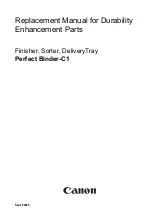
UTILITY STITCHES
———————————————————————————————————————————————————————
36
The names of parts of buttonhole foot “A”, which is
used for sewing buttonholes, are indicated below.
a
Button guide plate
b
Presser foot scale
c
Pin
d
Marks on buttonhole foot
e
5 mm (3/16 inch)
a
Use chalk to mark the position and length of
the buttonhole on the fabric.
a
Marks on fabric
b
Pull out the button guide plate of buttonhole
foot “A”, and then insert the button that will
be put through the buttonhole.
X
The size of the buttonhole is set.
■
If the button does not fit in the button guide
plate
Add together the diameter and thickness of
the button, and then set the button guide
plate to the calculated length. (The distance
between the markings on the presser foot
scale is 5 mm (3/16 inch).)
a
Presser foot scale
b
Length of buttonhole
(Di thickness of button)
c
5 mm (3/16 inch)
Example: For a button with a diameter of 15 mm
(9/16 inch) and a thickness of 10 mm (3/8 inch),
the button guide plate should be set to 25 mm
(1 inch) on the scale.
a
10 mm (3/8 inch)
b
15 mm (9/16 inch)
c
Attach buttonhole foot “A”.
d
Select a stitch.
e
Position the fabric with the front end of the
buttonhole mark aligned with the red marks
on the sides of the buttonhole foot, and then
lower the presser foot lever.
Pass the upper thread down through the hole
in the presser foot.
a
Mark on fabric
b
Red marks on buttonhole foot
A
1
2
5
3
4
1
A
1
3
2
1
2
A
1
2
2
NCBC2000.book Page 36 Thursday, October 21, 2004 4:32 PM
















































